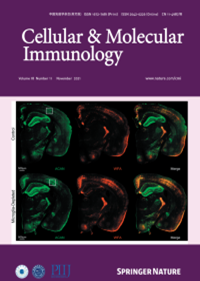CCR2+ monocytes promote memory CD8+ T-cell differentiation via membrane-bound TGF-β
IF 19.8
1区 医学
Q1 IMMUNOLOGY
引用次数: 0
Abstract
Upon antigen recognition, CD8+ T cells undergo robust expansion and differentiation to give rise to effector and memory CD8+ T cells. The spatial determinants of the fate of effector and memory CD8+ T cells during acute infection are poorly understood. By integrating single-cell RNA sequencing (scRNA-seq) and spatially resolved transcriptomics, we revealed that naïve CD8+ T cells adopted a divergent trajectory in which they rapidly differentiated into memory precursor (MP) cells and IFN-responsive cells, with the latter representing the entry point of the effector T-cell lineage. In the spleen, monocytes largely colocalized with CD8+ MP cells following antigen stimulation. Specifically, compared with dendritic cells (DCs), the Ly6ChiCCR2+ subset of monocytes promotes memory CD8+ T-cell differentiation. Mechanistically, monocytes express high levels of membrane-bound transforming growth factor-β (TGF-β), which is activated by thrombospondin-1 (TSP-1) to drive the memory CD8+ T-cell program through Smad signaling. Overall, our study reveals a novel spatial mechanism for CD8+ T-cell fate decisions, shedding light on the importance of monocytes in fostering memory CD8+ T-cell development in a cell‒cell contact- and TGF-β-dependent manner.

CCR2+单核细胞通过膜结合TGF-β促进记忆性CD8+ t细胞分化。
在抗原识别后,CD8+ T细胞经历强大的扩增和分化,产生效应和记忆CD8+ T细胞。急性感染期间效应和记忆性CD8+ T细胞命运的空间决定因素尚不清楚。通过整合单细胞RNA测序(scRNA-seq)和空间分辨转录组学,我们发现naïve CD8+ T细胞采用发散轨迹,它们快速分化为记忆前体(MP)细胞和ifn应答细胞,后者代表效应T细胞谱系的入口点。在脾脏中,抗原刺激后单核细胞与CD8+ MP细胞大量共定位。具体来说,与树突状细胞(dc)相比,单核细胞Ly6ChiCCR2+亚群促进记忆性CD8+ t细胞分化。机制上,单核细胞表达高水平的膜结合转化生长因子-β (TGF-β),该因子被血小板反应蛋白-1 (TSP-1)激活,通过Smad信号驱动记忆CD8+ t细胞程序。总的来说,我们的研究揭示了CD8+ t细胞命运决定的一种新的空间机制,揭示了单核细胞以细胞间接触和TGF-β依赖的方式促进记忆性CD8+ t细胞发育的重要性。
本文章由计算机程序翻译,如有差异,请以英文原文为准。
求助全文
约1分钟内获得全文
求助全文
来源期刊
CiteScore
31.20
自引率
1.20%
发文量
903
审稿时长
1 months
期刊介绍:
Cellular & Molecular Immunology, a monthly journal from the Chinese Society of Immunology and the University of Science and Technology of China, serves as a comprehensive platform covering both basic immunology research and clinical applications. The journal publishes a variety of article types, including Articles, Review Articles, Mini Reviews, and Short Communications, focusing on diverse aspects of cellular and molecular immunology.

 求助内容:
求助内容: 应助结果提醒方式:
应助结果提醒方式:


